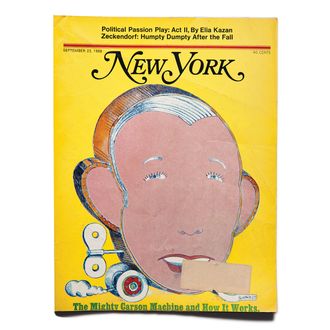
In the current issue of New York, David Marchese talks to Jimmy Kimmel about the late-night host’s recent emergence as a Cronkite for the Trump era. Here, we look back at how the magazine has covered the intersection of politics and late night through the years.
In 1968, Johnny Carson’s politics were limited by his network.
“ ‘The show is rigidly formatted, and we have a narrow range to work in. You begin to feel like a hack, writing NBC commissary and peacock jokes or Ed McMahon drinking jokes all day long,’ says a writer. NBC’s Standards and Practices department, network censors, asks that all political candidates be joked about equally. One writer complains bitterly because the show can have no ideologies or political point of view. ‘I’d love to do jokes about birth control and the drug culture and so would Johnny, but people who sell toothpaste have to be kept happy.’
“ ‘Johnny jokes least about [Eugene] McCarthy, because we can’t bring ourselves to write McCarthy jokes with any bite,’ says a writer.
‘But I think he’s pro-Humphrey because he didn’t use my Humphrey joke the other night.’
“ ‘No,’ interrupts another, ‘using that standard he is also pro-Goebbels.’ ” —Susan Braudy, September 23, 1968
Dick Cavett tried to challenge.
“Anything that arrests, disturbs, or quickens will cause people to tune in to something more innocuous. It’s only natural. But if something of world or national importance is going on, how can I not do a show about it? At those times I do think the show performs a real service. Or, less pretentiously, it fills a real need. At those times I have gotten a kind of fan letter that really is gratifying. Many people have said, when Robert Kennedy was shot, or when there was the blood bath at Attica, or at various times in the Watergate mess, that they couldn’t face the usual TV fare and just wanted to hear somebody, almost anybody, talk about what had happened.” —Dick Cavett, July 22, 1974
David Letterman started out apolitical, and then something turned.
“Somehow, without anyone looking, David Letterman has superseded the usual TV categories of comic, or talk-show host, or broadcaster.
He paces the stage at night worrying about the Afghan-election recount and generally free-associating about the flies and vultures flapping around in his head. His nightly broadcast from Broadway has become a weird and great American entity unto itself, a blurred throwback, an amalgam of the tradition he came from: Johnny Carson, Edward Murrow, Jack Paar. And the most middle-American of talk-show hosts has become the most New York–centric. He is also an increasingly interesting human being who has absorbed, not evaded, events and recorded, not denied, human experience.” —Peter W. Kaplan, September 14, 2009
Conan O’Brien took Letterman’s irony and flipped it on its head.
“Call it millennial anti-cynicism. The success of Late Night is built on having struck a chord with 15-to-25-year-olds who want no part of their elders’ bitterness at the demise of sixties ideals, seventies sex and drugs, and eighties materialism. And while O’Brien may have made a smart artistic decision, it works because it’s him. With Carson and Letterman one has always had the feeling that each man considers personal happiness fundamentally impossible; with O’Brien you get the sense that he thinks he has a shot at it. Maybe.” —James Kaplan, September 21, 1998
Jimmy Fallon stayed blithe.
“At a recent taping, Fallon conspired to provide the following entertainment for your last few seconds of consciousness: a duet with Dana Carvey; a visit from costume-wearing metal-mashers Gwar; and a segment called ‘If Puppies Could Vote,’ in which five adorable puppies choose a candidate by descending on one bowl of kibble or the other. Fallon’s best segments are upbeat and rarely have targets, let alone victims.” —Adam Sternbergh, November 15, 2010
And Stephen Colbert saw Fox News–style punditry as a character-generator.
“The real reason he’s having a very good year is that we’re about to head to the polls in what the Times has characterized as ‘the most toxic midterm campaign environment in memory,’ amid a barrage of attack ads that play out like Colbert-penned parodies. One Republican spot criticizes a Wisconsin Democrat and doctor for suing patients who hadn’t paid their medical bills and includes the line ‘Why don’t you just tell the truth, Dr.
Millionaire?,’ which is impossible to hear without imagining it in Colbert’s scolding, mock-stentorian voice … Colbert’s cleverly worded political doublespeak — like the press-corps-dinner joke ‘Don’t pay attention to the approval ratings that say 68 percent of Americans disapprove of the job [Bush] is doing. I ask you this: Does that not also logically mean that 68 percent of Americans approve of the job he’s not doing?’ — could plausibly have come from the mouth of Tony Snow. Or Donald Rumsfeld. Or Karl Rove.” —Adam Sternbergh, October 16, 2006
*This article appears in the October 30, 2017, issue of New York Magazine.


